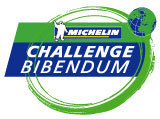Our Man in Paris @ The 2006 Michelin Challenge Bibendum - Chapter 1
By Thom Cannell
Detroit Bureau
The Auto Channel
2006 Michelin Challenge Bibendum
Boarding a flight to Paris is never an issue. Where and when do I show up with my passport, and can I force myself to adapt to the six-hour time difference ahead of the journey. Getting up at 2 AM to “Office” is never a fun thing, and 0430 is marginally doable.
Thus I prepared for the 2006 Challenge Bibendum, a world-wide invitational that challenges auto makers, fuel makers, and transportation technology companies to create a more sustainable future.
Ok, that’s a bit complex and what Grandma would call “high-falutin.’” But crisis is bearing down more swiftly than most wish to admit: experts say that before mid-century (perhaps by 2025) there will be less petroleum produced than is needed. It’s those millions of yet-to-be-built vehicles in China, India, Pakistan, Russia, and every where else. You think prices are high now? Yep, seriously bad ju-ju economic will occur.
My trip started with a mid-day puddle-jump from Lansing, MI to Cincinnati. Michelin, who paid for my journey, chose Air France and Business Class for those of us attending from the US. A mouse-click to the Air France web site said I would be coddled quite nicely. But lunch was required prior to boarding and Outback Steakhouse dealt successfully with the dichotomy of a kiddy meal accompanied by an adult beverage.
Following two coffees in the Delta lounge ( T-Mobile and other internet providers — charge by the minute, I’ll buy two minutes to check email, not 24 hours) and business calls, Flight 0383 boarded. It was six hours of Champagne (and being Air France it was Champagne) and choice of Halibut or Tournedos and a movie selection including current French films, Brokeback Mountain, Failure to Launch, something by Woody Allen, no Jerry Lewis.
Back to business. I’m excited to hear what others than we in the US think about the future of the automobile and what will fuel it. Following interviews and symposia at the recent SAE show in Detroit, I’m convinced that there is no one solution. While doom-sayers protest that we can’t grow enough corn to make ethanol (we can’t) we can improve technology to make methanol from an enormous variety of feedstocks that range from scrap paper, wood waste, and weeds, to CO2. Biodiesel looks promising, but similar problems in feedstocks make it a limited player. Key enablers for ethanol are improved enzymes to break down cellulose and yeasts more tolerant of the end product. Methanol requires production facilities and changes in storage and delivery of this more-corrosive liquid.
Hydrogen continues to confound me with its problems in logistics (storage and transport) and production. Oil from North America sands look good, as does the conversion of natural gas to liquid (GTL) and coal to liquid (CTL) though they have issues too. (On my way from airport to hotel Jerry Flint of Forbes Magazine showed me an article on Quatar partnering with a South African company to make fuel from its huge natural gas deposits.) A seemingly overlooked benefit of these liquid fuels is their contribution to pollution reduction. They have zero or near-zero sulfur and other contaminants that make cleaner exhaust emissions very challenging and costly.
So there just ain’t no magic bullet I’m aware of.
At breakfast with colleagues from Nigeria and Mexico I read up on Michelin’s outlook, their reason for bringing 500 journalist to Paris. They have a stake in the future as their role in fuel economy is undeniable: approximately 20% of an car’s fuel (30% in trucks) is consumed in overcoming rolling resistance.
But the conference isn’t about “Sustainable Mobility” as I understand it. I have a typically American reaction and think Sustainable Mobility means unlimited gasoline.
Actually, Sustainable Mobility mean very different things to different
 |
But for now it is time to walk along la Seine, find a café and kick back and enjoy Springtime in Paris.



